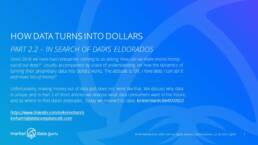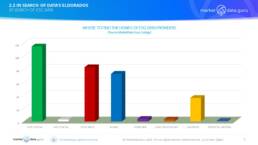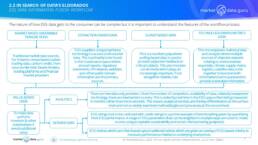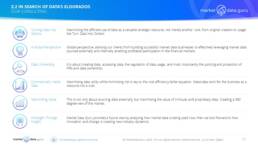
IN SEARCH OF ESG DATA
GETTING TO KNOW ESG DATA
Garter states Environmental, social and governance (ESG) ‘refers to a collection of corporate performance evaluation criteria that assess the robustness of a company’s governance mechanisms and its ability to effectively manage its environmental and social impacts. Examples of ESG data include the quantification of a company’s carbon emissions, water consumption or customer privacy breaches. Institutional investors, stock exchanges and boards increasingly use sustainability and social responsibility disclosure information to explore the relationship between a company’s management of ESG risk factors and its business performance.’ Naturally, this can be extended to countries, and every other entity requiring any form of financing.
As ESG has gone mainstream and big, the ESG Data market is set upon an upward trend, and detailed research provides leading indicators:
- In 2021 Bloomberg forecast Global ESG AUM will exceed $53 Trillion by 2025, i.e. 38% of all AUM, i.e. data required
- Environmental Finance (www.environmental-finance.com) predicts ESG data and services market could double to over $5 Billion by 2025 driven by the effects of the Covid-19 pandemic on investors, shareholder activism, increasing levels of regulation, and good old self interest
- Optimus Consulting believes 70% of the total ESG data market comprises research and analytics, (ESG ratings, raw data and dedicated solutions). The 30% balance is the faster growing ESG index business, increasingly dominated by FTSE Russell, MSCI and S&P DJI.
Key ESG Data Statistics
- 39% of the global ESG data market is supplied by firms launched less than five years ago (https://substantiveresearch.com)
- 37% of ESG providers are established data providers that developed their own ESG products (https://substantiveresearch.com)
- 26% of all the providers are generalists, providing data or services on environmental, social and governance factors (www.marketdata.guru)
- 64% specialise in one of the Environmental, Social, or Governance segments (www.marketdata.guru)
These statistics are too good to be true, right now ESG Data lacks global standards, the market is fragmented, coverage patchy, and transparency lacking, however none of this will lessen the opportunities available or inhibit the long term development of this marketplace.
DISCOVERING ESG DATA BUSINESSES
In a similar fashion to Alternative Data Providers, the majority of ESG Data businesses are usually Providers, not Sources. There is an important difference, Providers are either getting their data from the actual sources, and/or scrapping websites for information. Again, as in Alternative Data, the data provenance and integrity are understated concerns. Please see comments in FinTech section.
The majority of ESG Data is fairly static in terms of frequency of updates, and nowhere close to what in financial markets would be considered even ‘End of Day’. This results in a range of common features
- Low cost, low margin. Much of the data they source is freely available, the core number of employees is kept low, but there is a high number of external ‘quality control analysts’, which are freelancers, students, and similar, which analyse data received
- Technology driven, low barriers to entry. Heavy emphasis on tech, and as low margin, it is appealing to FinTech companies seeking to enter the market with minimal investment
- Intense competition because many ESG Data Providers are competing by using the same data as their peers. This gives a distinct advantage to the Buy-Side
PROBLEMS IN PARADISE
- The number of ESG original data sources is broad, but relatively shallow in depth, fragmented, generally unstructured, so no ESG provider can cover anywhere close to 100% of the market. This means the consumer is forced to data shop, then mix and max
- IPRs are nebulous and lack transparency because data is often scrapped or sourced publicly. This could be an issue in the future
- ESG Data Providers often have poor business models, do not understand the principles of data ownership and licences, resulting in ineffective pricing models, or no pricing models at all. This and IPR issues are problems for data consumers as well
- ESG Data Providers are usually located in countries where ESG issues are better understood, and more coverage is available. As the below chart details, (based on Market Data Guru listings information), geographical areas where there are ESG concerns and abuses are not well covered by local home grown ESG data providers, a good indicator that associated information is going to be challenging to source

FINTECH PLAYS
For any business seeking either ESG Data or ESG Services, due diligence is always a must. ESG Data Providers portray themselves as bleeding edge FinTech companies and they share key technology characteristics in how they present themselves, for instance:
- As FinTech businesses relying on technology to acquire and access original data, much of which is unstructured
- The use of ‘Artificial Intelligence’ (AI, well predicative analysis) in how they process data
- Leveraging ‘Big data’ to handle data volume, both structured and unstructured which can be formatted to allow analysis to gain insights for making investment decisions
- Utilising ‘The Cloud’ for accessibility
Technology allows ESG Data Providers to be highly efficient in data collation, organisation, and distribution, but as our research revealed, there are a number of ‘providers’ which provide in name only. They are virtual businesses which re-sell or white label other providers’ products and services.
This places an emphasis on business profiling, only for the consumer to find many shop windows are poor websites that inadequately describe the services and products either rendered or available, and often omit provide basic information like contact details and who they are. This can be interpreted as either warning signals or an indication of ill-considered business models.
The technology employed by ESG Data Providers has a direct impact on ESG Data Workflow which we detail below.

ESG DATA SUMMARY
For the ESG data consumer, sourcing a range of ESG data is a challenge, so it makes sense to assess where the strongest strategic values lie, for instance ratings when assessing what is needed and compared to what is offered. The danger is the consumer is acting more because they need to be seen to be engaging with the ESG world than making a detailed assessment of how to extract the best value to meet genuine ESG investment needs.
Rushing ESG data content strategies usually results in due diligence failures, for instance, does the buyer want to engage with ‘virtual’ companies which are more akin to market data aggregators than true sources by acting as white label offerings, but their true form is not immediately apparent?
Equally given the ESG data market has not yet stabilised from either an accessibility, or a standards/regulatory perspective the ESG data consumer is bring forced identify the most attractive options able to access new, and/or alternative quality data and data sources quickly but pursuing methodologies that are not optimised. This means that FinTech based partners which can engage higher levels of flexibility to adapt could well become preferred partners at the expense of vanilla data vendors.
In some ways the ESG data world looks reminiscent of the early 1980s PC market when multiple boutique manufacturers sprung up with their own proprietary systems, hardware and operating systems. As Microsoft quickly became the de facto standard piggy backing off the IBM PC they supply side of the market equation became decimated leaving a small number of PC manufacturers. The likelihood is that as standards develop, and become enforced for ESG data, the number of suppliers are going to decline, though probably not to the drastic extent of the PC makers.
This cull will be significant enough so that the ESG data consumers that are most effective in conducting rigorous and effective due diligence on their suppliers now will create an investment advantage over their less fastidious peers.
Keiren Harris 06 July 2022
Please contact info@marketdata.guru for a pdf copy of the article, and specialist insights in our bespoke reports.
For information on our consulting services please email knharris@datacompliancellc.com


